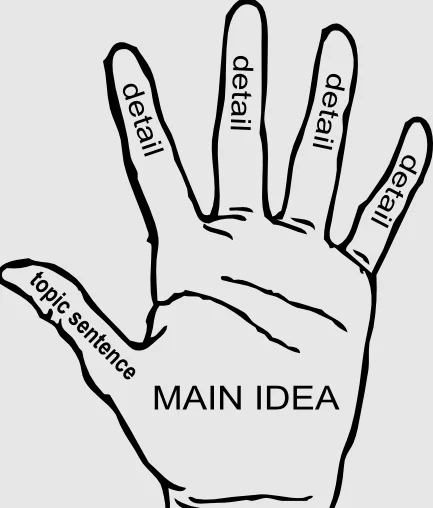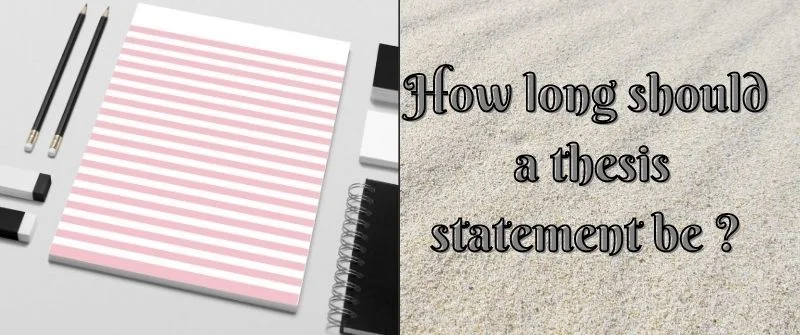A thesis statement identifies the discussion topic by including the points being discussed in your paper. You will place your thesis statement in the introduction. We use the thesis statement to draw the attention of the reader to continue to explore the topic.
The thesis statement will establish the direction of the whole paper. Furthermore, this thesis will take a stand to justify further action. It will narrow down the topic to a particular focus for investigation.
A thesis statement can limit what you want to write about. It is a platform where you will be informing your reader what you intend to cover in the paragraph body.
In this context, all the paragraphs in the essay should support, explain, or argue in the same direction as your thesis.
How Long is a Thesis Statement?
For one to understand the length of the thesis statement, it is sensible to know the type of essay you are crafting. For example, it is not reasonable to use a short statement on a short essay or a long one for a long essay.
When you are writing your thesis statement, it is critical to keep the word count of the essay. The word count will determine the length of the essay.
A thesis statement should only be one sentence long and not more than that because it needs to be succinct and clear. No matter the number of points or clauses you want to argue out, the thesis statement must be just a single statement.
Therefore, you need to compress all the clauses into a single sentence that takes a stand on what you are writing about.
Also, the length of the statement depends on the type of essay you are writing. Typically, the ideal scenario calls for a one-sentence statement. However, it can be a challenge for one to find a concise way of putting it in a single sentence.
The whole scenario needs a lot of thought and detailed scrutiny.

In the case of more extended essays, you will have to write a longer thesis statement.
That becomes useful as one should offer a detailed explanation of the topic to the audience, promoting the statement to appear long.
Also, the type of language used will dictate the length of the thesis statement.
The main goal in this situation is to capture the key ideas and arguments of your topic.
As such, you should express using words concisely. You should try to keep the thesis statement short as you capture the main ideas well.
Another aspect that determines the length of the thesis statement is how the author balances the general ideas and particular topic elements. You can keep your thesis statement to be specific by expressing your ideas well.
How to Write a Good Thesis Statement

A good thesis statement will sum up your central point about your essay paper. This statement will appear at the end of the introduction.
Whoever the type of your essay can make your thesis seem different. It should give the main idea of what you want to put across.
Writing a thesis statement will require proof and not a statement of facts.
The author must support the thesis statement with clear evidence to motivate the audience to continue reading it.
It becomes helpful to mention the supporting points in your thesis.
So, how do you come up with a good essay statement? It should happen as soon as you decide on your essay topic. The correct essay statement should offer direction to your essay.
There are two styles of thesis statements. It could be informative or persuasive. When you are composing an informative thesis, you should declare your intentions and guide the audience to the end.
When you are handing a persuasive thesis, it usually contains an opinion and offers the reason why the opinion is valid. Use the following variable when writing a good thesis statement:
1. Know the Topic
The topic is a basic idea of your paper. This topic has a few words or phrases that summarize the paper’s subject. If you are crafting an essay, ensure that your topic becomes as specific as possible.
Generally, the topic should cover something that you can learn about. It can be hard to write a thesis statement on something that you lack an understanding of. You should reflect on your personal experience to help you to discover your topic.
2. Begin with a Question

Your assignment should have a question, right? Suppose it lacks, try to include one. It should cover what you want to find out concerning your topic.
For example, when you are writing an argumentative essay, the question may prompt you to take sides, as given in the below example.
Has the game app been a threat to the social well-being of kids? Look at more examples by exploring some unique thesis statements about social media, another topic that is common in college essay writing.
3. Write Your Initial Answer
After performing initial research, you should now formulate a tentative answer to your question. Give a simple answer at this stage because it will guide the process of writing and researching.
If you are writing an argumentative essay, the answer should take sides to help the audience understand your position. For example:
The gaming app has a more positive impact on kids than negatives.
4. Limit Your Topic
The author should limit the topic based on the length of the final paper. It is helpful to limit the topic to a particular area. A longer paper will cover a broader scope and vice versa.
In our guide to writing good college essays, we explained how to get a good topic. This is the topic that will guide your thesis statement.
5. State the Main Idea
You should know what you are trying to prove or state about your topic. Also, understand what you want to persuade the reader to believe. As you state your opinion, it is important to express one major idea.

Again, you should name the topic as you assert something particular about it. Furthermore, you should take a stance on a particular issue which you can support with reasons and facts. Do not be shy to take a position.
6. Develop an Answer
At this stage, you need to convince your reader to believe that this is your answer. You should give a detailed answer as you read more about the topic and write.
The final thesis statement should summarize your overall arguments. The answer should be based on the thesis or the theme you are writing. But be keen to know the difference between thesis and theme so that you can know how to handle each.
7. Acknowledge any Opposing Viewpoint
A good thesis statement should acknowledge that there is also another side of an argument. The author should also include an opposing viewpoint to the thesis statement.
You should also write down what a different person who may disagree with your position should say.

